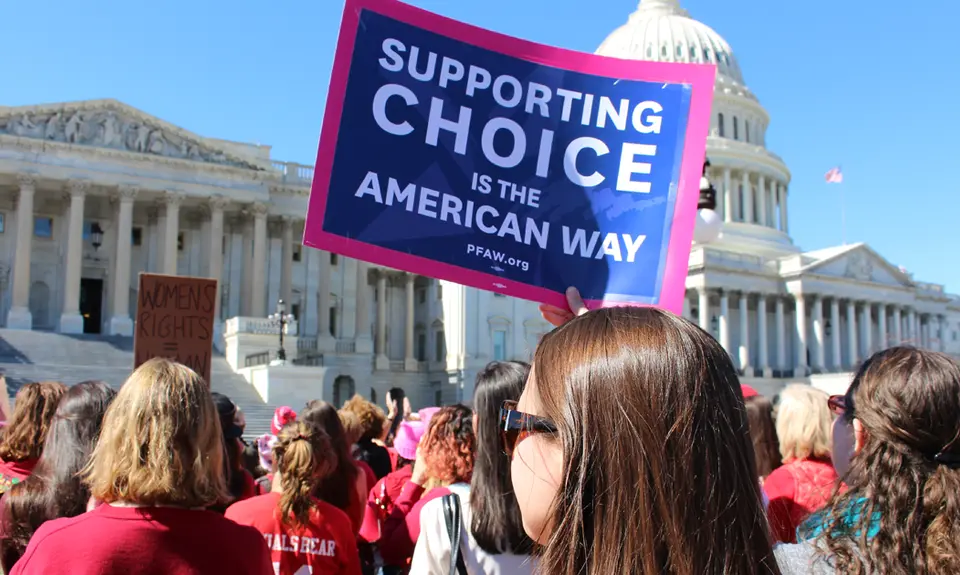“Confirmed Judges, Confirmed Fears” is a blog series documenting the harmful impact of President Trump’s judges on Americans’ rights and liberties. Cases in the series can be found by issue and by judge at this link.
Trump Sixth Circuit judges Amul Thapar, John Bush, Joan Larsen, John Nalbandian, and Chad Readler cast deciding votes in a 9-7 ruling that reversed a preliminary injunction against and effectively upheld a restrictive Ohio abortion law that bans and makes it criminal for doctors to perform abortions if they have knowledge that the woman “includes a Down Syndrome diagnosis in her decision-making process.” The April 2021 decision is in Pre-Term Cleveland v McCloud.
In 2018, Ohio enacted a law that criminalizes as a felony the performance of an abortion by a doctor who “has knowledge” that the woman is seeking an abortion, “in whole or in part,” because she believes that the fetus has Down Syndrome. A district court granted a preliminary injunction against implementation of the law, ruling that the statute violated. the principle that a woman has a clear right to seek an abortion prior to viability for any reason under Roe v Wade. A panel of three judges upheld the decision, and the full court decided to rehear the case.
In a 9-7 ruling in which Trump judges Thapar, Bush, Larsen, Nalbandian, and Readler cast deciding votes, the full Sixth Circuit reversed the district court and authorized the law to go into effect. The majority claimed that the Supreme Court’s Casey decision “corrected” what it called the “mistaken view” that Roe establishes a woman’s constitutional right to an abortion before viability. After Casey, the majority continued, any restriction on abortion, whether before or after viability, is constitutional unless its challengers can prove it imposes an “undue burden” on a woman seeking an abortion.
Under that standard, the majority went on, the Ohio law is clearly constitutional. The Oho law prohibits a doctor from performing an abortion if the woman has stated or shared records indicating that her reason related to Down Syndrome, the majority stated, but has no effect on doctors who do not have such knowledge. A woman can avoid any “undue burden,” the majority continued, by simply not telling a doctor “her reason for the abortion.” On the other hand, the majority maintained, the state has claimed “substantial” interests in “protecting the Downs syndrome community” from the “stigma” it allegedly suffers from such abortions, “protecting the integrity and ethics of the medical profession” and preventing “coercion by doctors” who improperly “advocate the abortion of all” fetuses with Down Syndrome.
Several judges in the majority tried to go even further in concurring opinions. Most notably, Trump judge Bush suggested that in his view, the “result would be the same” and the law would be valid even if it banned all abortions motivated in part by Downs syndrome concerns, regardless of doctors’ knowledge, based on the “original meaning” of the Constitution and Supreme Court precedent.
Seven judges strongly dissented, including two (Julia Smith Gibbons and Helene White) nominated by President George W Bush. All joined a dissent by Judge Bernice Donald, who carefully explained that Casey had actually “reaffirmed” the right to choose abortion before viability, which was violated by Ohio’s “unconstitutional ban.” Even under the “substantial burden” test, Donald went on, the record showed that the Ohio law was likely to impose such a burden by causing a woman to “conceal her medical records or history” and “forego” important education and counseling if she believes “her fetus has Downs syndrome,” and by “forcibly reaching into” the confidential doctor-patient relationship and requiring women to “be silent” or “lie.”
As to the state’s claimed interests, Donald continued, the record suggested little evidence to support them. On the contrary, she went on, the record indicated that Ohio was “politicizing” and not benefiting the Downs syndrome community, particularly in light of the remarkable suggestion in the state’s reply brief that it would provide resources and support “only if there are enough” people with Downs syndrome to “merit addressing the ‘problem.’” Nor was there evidence of doctors seeking to coerce abortion in cases of Downs syndrome or medical ethics problems, issues that Donald explained would be better addressed through education and enforcement of the state’s “preexisting ethical obligations” on physicians. In short, Donald concluded, the majority “renounces” the rule of law and shows clear “hostility to the right Roe and Casey secured.”
As Judge Karen Nelson Moore noted, the majority’s opinion “betrays the elephant in the courtroom:” many current appellate court judges “do not believe that the right to abortion should exist.” That is clearly true with respect to Judges Bush, Thapar, Larsen, Nalbandian, Readler, and many other Trump judges around the country. And it underlines the importance of our fight to promptly confirm as many fair-minded Biden nominees with a demonstrated commitment to equality and justice for all as possible to vacancies on our federal courts.
